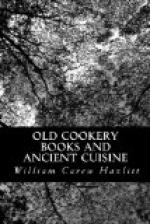Of these books, I select the preface to “The Complete Housewife,” by E. Smith, 1736, because it appears to be a somewhat more ambitious endeavour in an introductory way than the authors of such undertakings usually hazard. From the last paragraph we collect that the writer was a woman, and throughout she makes us aware that she was a person of long practical experience. Indeed, as the volume comprehends a variety of topics, including medicines, Mrs. or Miss Smith must have been unusually observant, and have had remarkable opportunities of making herself conversant with matters beyond the ordinary range of culinary specialists. I propose presently to print a few samples of her workmanship, and a list of her principal receipts in that section of the book with which I am just now concerned. First of all, here is the Preface, which begins, as we see, by a little piece of plagiarism from Nott’s exordium:—
“PREFACE.
“It being grown as unfashionable for a book now to appear in publick without a preface, as for a lady to appear at a ball without a hoop-petticoat, I shall conform to custom for fashion-sake, and not through any necessity. The subject being both common and universal, needs no arguments to introduce it, and being so necessary for the gratification of the appetite, stands in need of no encomiums to allure persons to the practice of it; since there are but few now-a-days who love not good eating and drinking. Therefore I entirely quit those two topicks; but having three or four pages to be filled up previous to the subject it self, I shall employ them on a subject I think new, and not yet handled by any of the pretenders to the art of cookery; and that is, the antiquity of it; which if it either instruct or divert, I shall be satisfied, if you are so.
“Cookrey, confectionary, &c., like all other sciences and arts, had their infancy, and did not arrive at a state of maturity but by slow degrees, various experiments, and a long tract of time: for in the infant-age of the world, when the new inhabitants contented themselves with the simple provision of nature, viz. the vegetable diet, the fruits and production of the teeming ground, as they succeeded one another in their several peculiar seasons, the art of cookery was unknown; apples, nuts, and herbs, were both meat and sauce, and mankind stood in no need of any additional sauces, ragoes, &c., but a good appetite; which a healthful and vigorous constitution, a clear, wholesome, odoriferous air, moderate exercise, and an exemption from anxious cares, always supplied them with.
“We read of no palled appetites, but such as proceeded from the decays of nature by reason of an advanced old age; but on the contrary a craving stomach, even upon a death-bed, as in Isaac: nor no sicknesses but those that were both the first and the last, which proceeded from the struggles of nature, which abhorred the dissolution of soul and body; no physicians to prescribe for the sick, nor no apothecaries to compound medicines for two thousand years and upwards. Food and physick were then one and the same thing.




